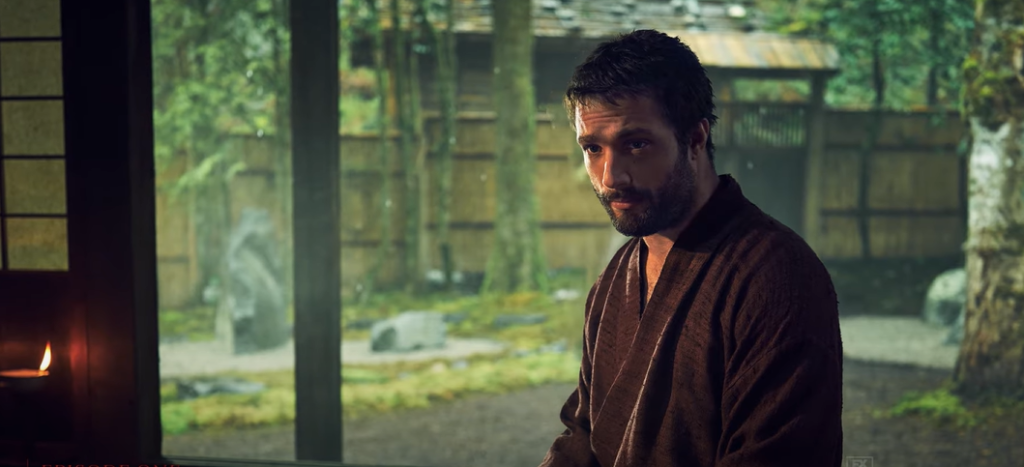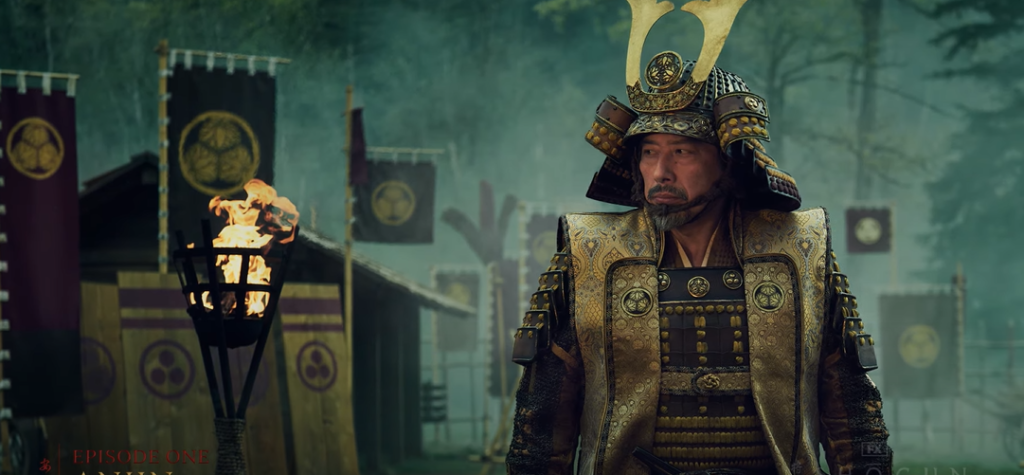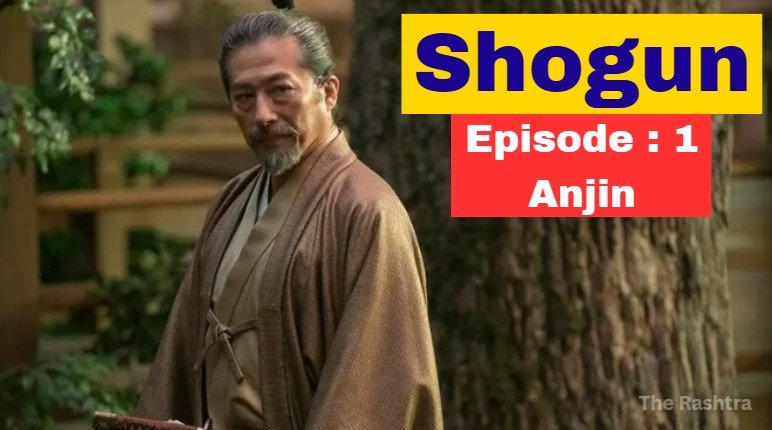Shogun, Episode 01 – Anjin: Intricate feudal politics. A ship adrift at sea, its crew decimated by hunger, disease, and worse. A nation teetering on the edge of conflict. Clashes of customs and perilous encounters as different cultures collide like waves against a rocky shore. The end of one era and the dawn of another. Feudal Japan in a time of turmoil, with Catholic Portuguese allies, and newly arrived English and Dutch Protestants embroiled in conflict, all set against a backdrop of stunning cinematography, impeccable costume design, and remarkable acting. Shogun emerges as an instant sensation—stunningly beautiful, tragically compelling, and utterly gripping.
While I haven’t delved into James Clavell’s 1,152-page tome that serves as the foundation for this new series, I’ve embarked on the journey and made some headway. Rather than bypassing the original source material or fixating on comparisons between the book and its adaptation, I’ve chosen to read alongside each episode’s release on Hulu. This approach allows me to review the series without the bias of prior knowledge, yet still affords me the opportunity to explore both narratives. Thus, I can offer insights into the show’s strengths and weaknesses independently.
Moreover, tackling a book of such length isn’t a task for the faint-hearted (especially with “Three Body Problem” on my reading list as well). But that’s perfectly fine! There’s a certain thrill in approaching a story without prior knowledge of its source material. Take, for example, the live-action adaptation of “Avatar: The Last Airbender”—I’m certain I’d be relishing it more if I hadn’t been familiar with the animated original.

After delving into the first episode of Shogun, I discovered that FX and Hulu had actually dropped the first two episodes simultaneously. However, I’ve committed to reviewing each episode individually, so this post will solely focus on the series premiere, “Anjin.” I’ll follow up with a separate review for the second episode tomorrow. Moving forward, I’ll be sharing weekly recap/reviews right here on this blog. It’s genuinely thrilling because I’ve been feeling quite disappointed by most of the recent content I’ve covered (except for you, Slow Horses!). So, it’s incredibly refreshing to feel genuinely enthusiastic about a new series. Anyway, let’s delve into…
I won’t delve into a detailed recap. Let’s cover the essentials. “Angin” in Japanese translates to “pilot,” which is a reference to one of the central characters in the show, John Blackthorne (played by Cosmo Jarvis). However, I suspect it may carry a dual significance, also alluding to another key character, Lord Yoshi Toranaga (portrayed by Hiroyuki Sanada), who endeavors to navigate Japan toward a brighter tomorrow. Both men face formidable challenges, culminating in a climactic encounter as the series premiere draws to a close.
It’s the year 1600, as indicated by a title card at the start of the episode—an approach I commend because it swiftly dispenses with setup exposition, allowing us to dive straight into the engaging material. At this time, the Portuguese enjoy a prosperous trade alliance with Japan. Moreover, they’ve established a significant presence of Catholic missionaries, resulting in a considerable portion of Japan embracing Christianity.
Blackthorne, an Englishman aligned with the Dutch, is on a mission to locate Japan and initiate efforts to diminish Catholic influence over the region. The Protestant colonizers are eager to claim their share of the lucrative trade, currently dominated by the Catholics. However, their journey is fraught with challenges, resulting in the loss of several ships and crew members. Upon being rescued and then promptly imprisoned by the Japanese, only a handful, including Blackthorne, remain.

Interestingly, both groups perceive the other as “barbarians” or “savages,” likely due to stark cultural differences. The sailors exhibit unkempt behavior, while the Japanese adhere to customs such as seppuku. In a disturbing scene, Tadayoshi, serving Lord Toranaga, publicly vows to commit ritual suicide, including his infant child, as penance for his outburst during a meeting of Japan’s regents. While this act is horrifying, it’s not the most shocking moment in the series premiere, as the actual killing of the baby is not depicted.

The most chilling moment in the episode unfolds as one of the crew members faces a gruesome fate—slowly boiled to death in a massive cauldron, while Blackthorne narrowly escapes execution despite fervent demands from a Catholic priest. This barbaric method of punishment serves as a stark reminder of the violent tendencies embedded within both cultures. Blackthorne’s allegiance to a colonial power destined to dominate the globe doesn’t justify such brutality, emphasizing the darkness lurking in humanity.
Yabushige’s desire to claim the ship and its weaponry for himself sets the stage for political intrigue, as a village spy, also loyal to Lord Toranaga, tips off Toranaga’s right-hand man, Toda Hiromatsu. With Toranaga’s intervention, Blackthorne is spared and escorted to Osaka, where a fierce storm nearly claims the lives of all onboard. However, Blackthorne’s seafaring expertise proves instrumental in averting disaster, showcasing his resourcefulness and resilience amidst perilous circumstances.

Blackthorne’s act of valor extends to his unexpected ally, Rodrigues, a Spaniard in the employ of the Portuguese. Despite being cast overboard, Blackthorne’s insistence leads to Rodrigues’ rescue from the perilous cliffs. Though Blackthorne offers to descend and assist, Yabushige, the Japanese lord, declines, prompting Blackthorne to provide the rope and honorably insists that Yabushige descend himself. Amidst the tumultuous sea, Yabushige narrowly escapes death, his life spared by a last-minute rescue, reminiscent of Sam Gamgee’s foresight.
Following Rodrigues’ rescue, Blackthorne is escorted to Osaka, where he finally encounters Toranaga. As Toranaga faces mounting challenges from rivals, he sees potential in Blackthorne, recognizing the possibility of aid from this outsider, though the extent of Blackthorne’s role remains undisclosed for now.
The intricate political landscape depicted in “Shogun” is deeply engrossing. It evokes parallels with “Kingdom” on Netflix, albeit in a vastly different context of Korean feudalism and zombies, which is another must-watch series. Here, amidst the power struggles and alliances, Toranaga emerges as a figure of honor and resolve, poised against the formidable regent Ishido Kaznari. The impending conflict reverberates with the drums of war, with Toranaga facing formidable odds against the majority of the ruling regents.

The stage is set for an epic saga set in feudal Japan, with the arrival of the first European colonizers adding layers to the clash of civilizations. This collision not only pits Japan against the West but also stirs tensions between Protestant and Catholic factions. The series promises an exhilarating journey, elevated by its stellar cinematography, evocative score, and outstanding performances. Cosmo Jarvis’s portrayal channels a complexity akin to Tom Hardy, presenting a character who transcends simplistic hero archetypes. Meanwhile, Hiroyuki Sanada embodies Toranaga with a nuanced blend of strength and restraint, navigating the treacherous waters of politics and tradition with remarkable poise.

